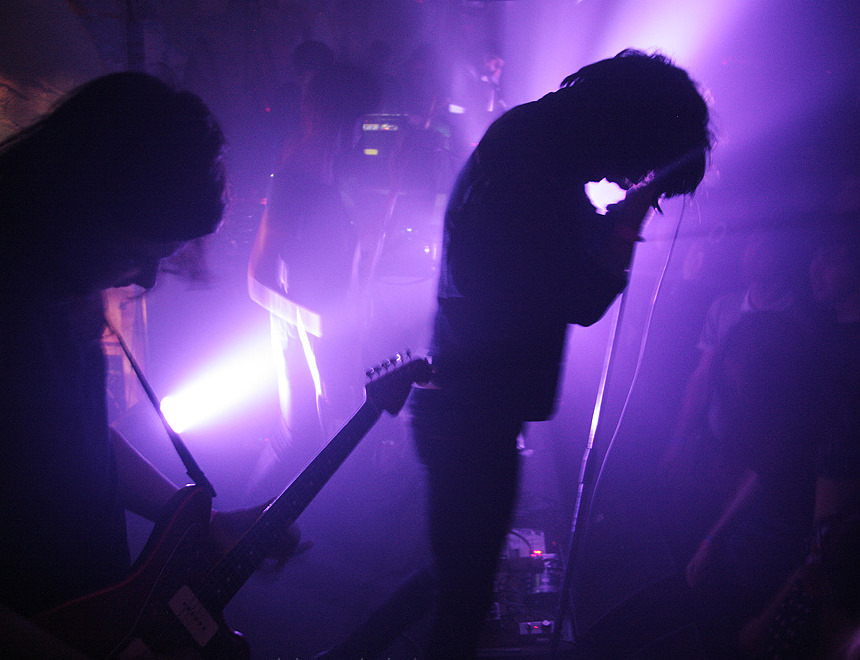If 2011 belongs to discussions about pop nostalgia then this gig is its live pinnacle. The Horrors, the quintet singled out by some as most embodying Simon Reynolds’s phrase “record collection rock”, are playing the 100 Club. It is a gig set up by Mojo magazine, which rubber-stamped the retro phase we seem to have reached the peak of when it was first published in 1993. Almost as if to make us feel like we are walking around a living issue of the magazine, its logo is prominently displayed throughout the venue, in a way canonising The Horrors as the type of band your normal geezer might quite like. Indeed, the venue is divided between mature music fans waiting patiently for the gig to start and younger fans down the front who later sing along to the songs from the band’s third LP Skying – an album released only three days ago – as if they are old favourites.
On the left hand side of the stage, Tom Cowan tends to his synths like a scientist, sometimes grinning with the joy of it all; on the right, Josh Hayward flings his guitar around like Cowan’s more robust partner, equally resolute in his desire to extend the Horrors sonic palette and armed with home-made pedals and wired up boxes, but a wildman where his bro is calm. In the middle is Rhys Webb, who weaves and skips and drives the group forward with drummer Joe Spurgeon. Up front is the lurching provider of baritone Faris Badwan.
The reaction to the band in the press always feels like it is quite a personal one. The Guardian’s Dorian Lynskey, for example, tweeting after Monday’s gig at the recently indie-fied Shacklewell Arms in Dalston, likened them to a mashing together of his 80s goth and rave affections. This site’s very own Luke Turner projects his eternal besottedness with Suede onto the group, which to be fair, seems pretty spot on at times. ‘Monica Gems’ could be a Suede song, what with Faris’s Oh-ho-ing all over the place. But I think more than anything what Mr Turner is seeing is a band that thinks it’s a gang, because that’s what it is: a gang of individuals that share a love of a lot of music – more specifically, a lot of vinyl – and have moulded this love into a coherent shape.
For this writer, the reaction is a different kind of personal. The bass player so deftly shimmying around the stage, Rhys Webb, is, to me, one of those formative-year people who got me into a life of music – rare, seemingly unobtainable music. He sold me a record by The Manish Boys, David Bowie’s early outfit, when I was 13. Teenage years were characterised by visits to his room to hear 60s psych records while Rhys would line up vinyl after vinyl of rare soul, garage, psych, beat, and bluebeat. Pre-internet forays into pop’s hidden delights through record hunting, before it earned the title of crate diggin’.
As the years passed, the eras being consumed changed and intermingled with each other. Heavy rock gave way to punk which made way for post-punk, mimicking, in fast-forward, the evolution of the music the first time around. Anything went by the time Junkclub, the monthly happening set up by Rhys and his friend, fellow records-and-old-clothes obsessive Oliver Abbott, came along; the night started to attract the national press. Aforementioned Mr Lynskey hopped aboard a c2c train to cover the club’s last night for the Guardian. Writers and photographers for the NME and others found a muse in this cramped basement underneath a high street that was at pains to be recognised as a void.
Above all, back then, records were for dancing (and when they weren’t they were for coming down). You can hear the ideal most clearly in ‘I Can See Through You’ tonight. The song explodes into being, revealing itself as a shimmering Northern Soul stomper, gleaned from the mod allnighters that Webb and co used to gravitate to in their mid-teens and given a twinkling synthed-up makeover.
They’ve become something quite rare: a stadium-worthy band who bring with them a fascination with the heritage of sound (and hence its potentialities), from Delia Derbyshire and the Radiophonic Workshop’s minimal electronics to maximal psychedelic explosions from each decade since pop began. The approach is reflective of records of yore but doesn’t share the hallmarks of hauntology, and thus doesn’t quite adhere to the acceptable guidelines of music that raids the past for its future (which is why so many positive reviews of Skying practically read like an apology for liking it).
Influences are not frayed, patched up or faux-DIY’d here: they are welded together, moulded into shapes. It is as if they were put together by an external design team – except they weren’t. The band is a product of a shared obsession with sound and pop. A refusal to accept wider-held beliefs, agreed upon logics: definite sounds based on primary research, without regard to what the demographic might think because if you put the work in, the demographic will come. It is a tale of perseverance: from the uncoolest of all ‘cool’ bands (and as such pretty cool) when Strange House dropped, to the darlings of hipsters and musos and average Joes that you see today. Becoming a staple on Radio 1’s A List and The Quietus doesn’t happen all too often.
“Now the echoes are endless… Gotta give me more,” intones Faris on the gorgeous ‘You Said’, a song that is not played tonight but which typifies the floaty edges of Skying. It is a line that describes the predicament rather well, of this band that reflects a culture’s pop obsession back to it. The cycle of influences draw us further and further in, with no way of knowing when to stop, or how – or why we would even bother in the first place. Such is the pleasure of the dive.


